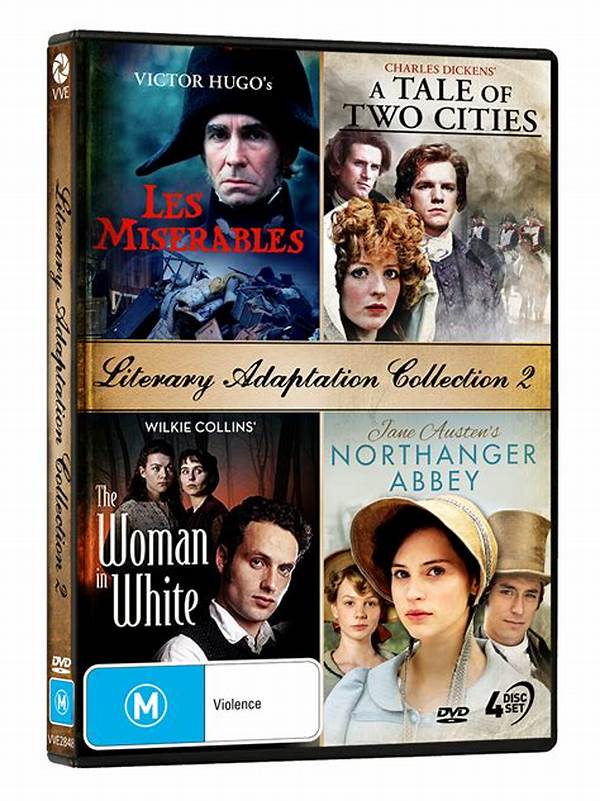Hey there, literature lovers and movie buffs! It’s no secret that the world of film and television has been buzzing with adaptations of our favorite books. But what makes it even more exciting is the surge of incredible women who are steering the ship in bringing these stories to life. Women leading literary adaptations are taking the industry by storm, and it’s high time we talk about it!
Read Now : Health And Fitness Strategies For Models
The Powerhouse Directors and Writers
Let’s dive into the phenomenal world of women leading literary adaptations and how they’re reshaping our screens. These women have taken beloved stories and infused them with fresh perspectives, bringing a unique flair that sometimes only a woman’s touch can add. From classic novels to modern bestsellers, they are paving the way for more inclusive storytelling.
Whether it’s Greta Gerwig’s stunning rendition of “Little Women” or Ava DuVernay’s powerful take on “A Wrinkle in Time,” their work is not just about staying true to the source material. They elevate the stories, often amplifying diverse voices and perspectives that resonate with today’s audience. It’s a movement that’s not just changing how stories are told, but how they are appreciated, turning literature into a more inclusive medium.
Their passion, insight, and dedication make these adaptations resonate with audiences across the globe. Women leading literary adaptations are not only changing how we view these stories but also challenging the norms of storytelling. It’s refreshing to witness this transformation and see characters we’ve grown up with reimagined in ways we could only dream of. So, here’s to the women who dare to dream even bigger!
Notable Women Leading the Charge
1. Greta Gerwig – Known for her remarkable rendition of “Little Women,” she brought new life to a beloved classic.
2. Ava DuVernay – Her adaptation of “A Wrinkle in Time” showcased brilliant diversity and creativity.
3. Niki Caro – With her direction of “The Zookeeper’s Wife,” she managed to capture history with sensitivity and strength.
4. Reese Witherspoon – As a producer, her work with “Big Little Lies” turned an engaging novel into a gripping series.
5. Chloe Zhao – Breathed cinematic magic into various adaptations, focusing on authenticity and depth.
These women leading literary adaptations not only prove that they can tell engaging stories but also highlight the importance of varying perspectives in filmmaking.
The Evolution of Adaptations
The evolution of women leading literary adaptations marks a significant shift in the storytelling landscape. It’s not just about adapting a book for the screen; it’s about transforming the narrative to suit modern sensibilities. These women understand the intricacies and nuances of the text and articulate them beautifully on screen.
Their approach often brings a fresh authenticity, sometimes lacking in previous adaptations. By incorporating more diverse voices and perspectives, they add layers of depth and emotional resonance. It’s this ability to dig deeper and shine the spotlight on underrepresented voices that makes their work so impactful.
Beyond merely retelling a story, these adaptations become a dialogue between the past and present. They remind us why certain narratives endure and why they still matter. Women leading literary adaptations are crafting a legacy that will inspire countless storytellers and audiences for generations to come.
Exploring the Impact on Viewers
1. Women leading literary adaptations create stories that resonate with contemporary audiences, bridging generational gaps.
2. They empower other female filmmakers, showing that there’s a place for women at all levels of filmmaking.
3. These adaptations often highlight underexplored angles, offering fresh insights and challenging stereotypical depictions.
Read Now : Celebrities With Strong Digital Influence
4. The diversity they bring encourages more inclusive storytelling, capturing a wider audience demographic.
5. They inspire audiences to revisit the original books, invigorating interest in classic literature.
6. Women directors and writers demonstrate mastery over complex narratives and dynamic character development.
7. Their adaptations often fuel conversations about social issues, sparking meaningful dialogue in society.
8. They can challenge and redefine genres, pushing creative boundaries in filmmaking.
9. The authenticity of emotions and perspectives they create garners critical acclaim and audience adoration alike.
10. Women leading literary adaptations continue a tradition of innovation, redefining what it means to adapt a story.
Challenges and Triumphs
Every adaptation process comes with its own set of challenges and triumphs, especially for women leading literary adaptations. While navigating the industry remains a daunting task for many, these women persist. Developing a visionary project in a male-dominated industry demands a mix of resilience, creativity, and determination.
However, their success is testament to the significant progress that has been made. They’re not only battling for better representation but also for narratives that reflect real-world complexities. The hurdles they face often lead to a more formidable drive, resulting in innovative and groundbreaking adaptations.
These women have proven their mettle. Their triumph isn’t merely in creating acclaimed adaptations; it’s in how they use their art to break barriers and build bridges. By boldly taking the reins, women leading literary adaptations are crafting a brighter, more inclusive future for the industry.
Conclusion: The Future of Adaptations
As more women rise to prominence in adapting literary works, the future seems promising. Their roles as storytellers offer new lenses through which audiences can view humanity, empathy, and diversity. Women leading literary adaptations have unlocked a world of possibilities, reshaping how stories will evolve.
Their contributions send ripples throughout the film industry, encouraging more diversified voices to echo the call for change. The legacy they are creating isn’t just one of personal achievement but a broader transformation in the narrative landscape. With their talent and determination, women leading literary adaptations are setting a dynamic precedent for generations to follow. So, let’s celebrate their genius and continue to support a space where every story, every voice, has the opportunity to shine.
